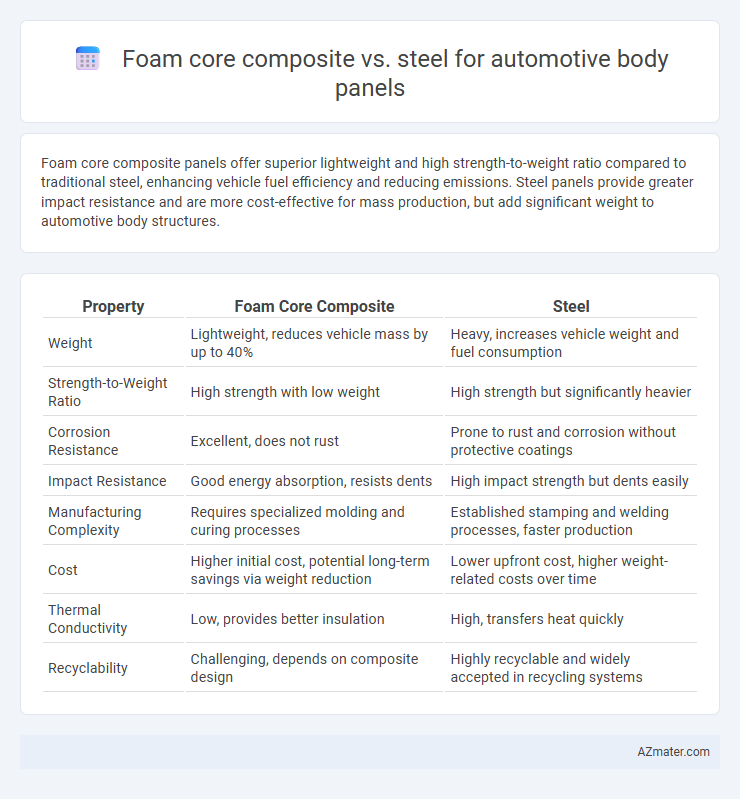Foam core composite panels offer superior lightweight and high strength-to-weight ratio compared to traditional steel, enhancing vehicle fuel efficiency and reducing emissions. Steel panels provide greater impact resistance and are more cost-effective for mass production, but add significant weight to automotive body structures.
Table of Comparison
| Property | Foam Core Composite | Steel |
|---|---|---|
| Weight | Lightweight, reduces vehicle mass by up to 40% | Heavy, increases vehicle weight and fuel consumption |
| Strength-to-Weight Ratio | High strength with low weight | High strength but significantly heavier |
| Corrosion Resistance | Excellent, does not rust | Prone to rust and corrosion without protective coatings |
| Impact Resistance | Good energy absorption, resists dents | High impact strength but dents easily |
| Manufacturing Complexity | Requires specialized molding and curing processes | Established stamping and welding processes, faster production |
| Cost | Higher initial cost, potential long-term savings via weight reduction | Lower upfront cost, higher weight-related costs over time |
| Thermal Conductivity | Low, provides better insulation | High, transfers heat quickly |
| Recyclability | Challenging, depends on composite design | Highly recyclable and widely accepted in recycling systems |
Introduction to Automotive Body Panel Materials
Foam core composite materials offer lightweight solutions with high stiffness-to-weight ratios, enhancing fuel efficiency and vehicle performance in automotive body panels. Steel remains a traditional choice due to its strength, durability, and cost-effectiveness, providing excellent impact resistance and ease of manufacturing. The automotive industry increasingly balances these materials' properties to optimize structural integrity, weight reduction, and overall vehicle dynamics.
Overview of Foam Core Composite Panels
Foam core composite panels consist of a lightweight foam core sandwiched between two layers of composite materials, offering high strength-to-weight ratios ideal for automotive body panels. These panels provide excellent impact resistance, noise dampening, and superior thermal insulation compared to traditional steel panels. Their corrosion resistance and design flexibility contribute to improved fuel efficiency and enhanced vehicle performance in modern automotive manufacturing.
Steel: Traditional Choice in Car Manufacturing
Steel remains the traditional choice for automotive body panels due to its high tensile strength, durability, and cost-effectiveness. Its excellent rigidity and impact resistance provide enhanced safety and structural integrity in vehicles. Despite the rise of foam core composites, steel's established manufacturing processes and recyclability continue to make it a preferred material in car production.
Weight Comparison: Foam Core Composite vs Steel
Foam core composite materials offer a significant weight reduction compared to traditional steel in automotive body panels, often achieving up to 50-60% lighter structures. This weight savings translates into improved fuel efficiency and enhanced vehicle performance due to lower mass and better energy absorption. Steel remains heavier but provides superior strength and durability, while foam core composites balance lightweight characteristics with adequate structural integrity for modern automotive design.
Strength and Durability Analysis
Foam core composites exhibit superior strength-to-weight ratios compared to steel, providing enhanced impact resistance and reducing overall vehicle weight for improved fuel efficiency. The foam core acts as an energy absorber, improving durability by minimizing denting and corrosion issues commonly associated with steel panels. Long-term performance studies reveal foam core composites maintain structural integrity under cyclic loading and environmental stress better than traditional steel, making them ideal for advanced automotive body panels.
Corrosion Resistance and Longevity
Foam core composites offer superior corrosion resistance compared to steel, as they are immune to rust and chemical degradation, enhancing the longevity of automotive body panels. Steel panels require protective coatings and regular maintenance to prevent corrosion, which can compromise structural integrity over time. The inherent durability of foam core composites reduces the need for frequent repairs, leading to longer-lasting vehicle exteriors.
Manufacturing and Production Costs
Foam core composite panels offer significant manufacturing cost savings over steel due to lower material weight and simplified assembly processes, reducing energy consumption and labor expenses. The use of foam cores eliminates the need for extensive stamping and welding operations typical in steel panel production, streamlining production workflows. While the initial investment in composite tooling may be higher, the overall production costs decrease with high-volume manufacturing due to faster cycle times and less expensive logistics.
Safety and Crashworthiness Considerations
Foam core composites offer superior energy absorption and controlled deformation during crashes, enhancing occupant protection compared to traditional steel automotive body panels. The lightweight nature of foam core composites reduces overall vehicle mass, contributing to improved crash dynamics and reduced kinetic energy impact. Steel panels provide high structural strength but tend to transfer greater force to occupants, whereas foam core composites balance strength and energy dissipation for improved crashworthiness.
Environmental Impact and Sustainability
Foam core composite automotive body panels offer significant environmental benefits over steel, including lower carbon emissions during production and enhanced recyclability, reducing overall vehicle weight and improving fuel efficiency. Steel, while durable and widely recycled, requires energy-intensive mining and smelting processes, resulting in higher greenhouse gas emissions and resource depletion. The adoption of foam core composites contributes to sustainable automotive manufacturing by minimizing environmental impact through lightweight design and potential for circular economy integration.
Future Trends in Automotive Body Panel Materials
Foam core composites are increasingly favored for automotive body panels due to their superior strength-to-weight ratio, corrosion resistance, and improved energy absorption compared to traditional steel. Future trends indicate a shift towards lightweight composite materials like foam core composites to enhance fuel efficiency and reduce carbon emissions in automotive manufacturing. Advances in manufacturing technologies, such as automated fiber placement and resin transfer molding, are accelerating the adoption of foam core composites over steel in high-performance and electric vehicles.

Infographic: Foam core composite vs Steel for Automotive body panel
 azmater.com
azmater.com